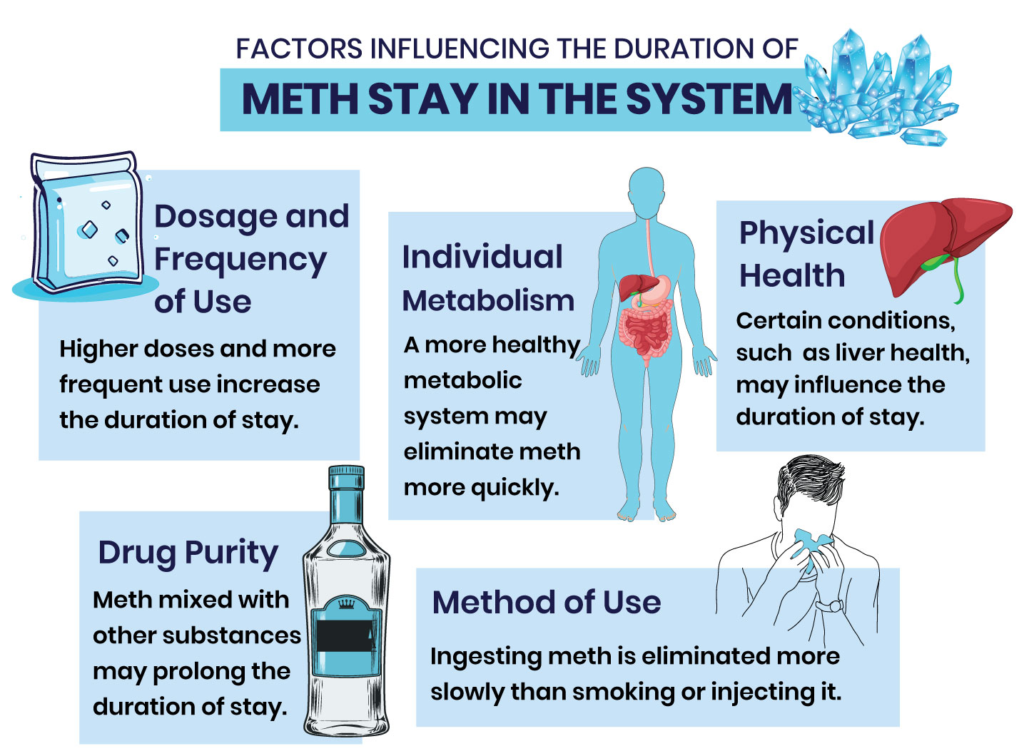If you’re searching for ways on how to get meth out of your system faster, understanding the process is crucial. Methamphetamine, commonly known as meth, is a powerful stimulant that can linger in your body for an extended period. Knowing how to get meth out of your system faster can significantly impact your recovery process and overall health.
Introduction to Meth Detox
Methamphetamine, commonly known as meth, is a powerful and highly addictive stimulant that affects the central nervous system. Once ingested, meth can remain in your system for several days, depending on various factors such as the amount used, frequency of use, and individual metabolism. For those facing a drug test or wanting to cleanse their body, understanding how to get meth out of your system faster is crucial. This article provides detailed information on detox methods, including natural remedies, medical options, and strategies for managing withdrawal symptoms.
How Long Does Meth Stay in Your System?
Factors That Affect Meth Detection Times
The length of time meth stays in your system can vary widely based on several factors. These include the amount of meth used, the method of ingestion (smoking, snorting, injecting, or swallowing), your overall health, and your metabolism. For example, a healthy individual with a faster metabolism may eliminate meth from their body quicker than someone with a slower metabolism.
Typical Duration Meth Stays in Blood, Urine, Saliva, and Hair
Meth can be detected in different parts of the body for varying lengths of time. Typically, meth can be found in:
- Urine: Up to 3 days after use
- Blood: 1 to 3 days after use
- Saliva: Up to 4 days after use
- Hair: Up to 90 days after use
These detection windows can influence your detox strategy, especially if you are preparing for a drug test.

Natural Ways to Speed Up Meth Detox
Hydration and Its Role in Detoxification
Staying well-hydrated is one of the simplest and most effective ways to help flush meth out of your system faster. Water helps to dilute the concentration of meth in your body and aids in its excretion through urine. Aim to drink plenty of water throughout the day to support your detox process.
The Benefits of Exercise and Sweating Out Toxins
Exercise is another powerful tool in speeding up meth detox. Physical activity increases your metabolism, which can help your body process and eliminate meth more quickly. Additionally, sweating during exercise helps to expel toxins through your skin. Regular cardiovascular exercise, such as running, cycling, or swimming, can be particularly effective.
Dietary Changes to Support Faster Detox
Your diet plays a significant role in detoxification. Consuming a diet rich in antioxidants, vitamins, and minerals can support your body’s natural detox processes. Foods like fruits, vegetables, and lean proteins can help your liver and kidneys function more efficiently, speeding up the elimination of meth from your system. Additionally, avoiding fatty and processed foods can prevent your body from becoming sluggish during detox.
Read to Know About: Clever DPSCD
Medical Detox Options
The Role of Medical Supervision in Safe Detoxification
For individuals who have been using meth heavily or for an extended period, medical detox may be the safest and most effective option. Medical detox involves undergoing detoxification under the supervision of healthcare professionals who can monitor your progress and manage any complications that arise. This approach ensures that the detox process is both safe and as comfortable as possible.
Detox Medications and Therapies
In a medical detox setting, doctors may prescribe medications to help manage withdrawal symptoms and reduce cravings. These medications can make the detox process more manageable and increase the chances of a successful recovery. In addition to medication, therapies such as counseling and support groups are often integrated into the detox process to address the psychological aspects of meth addiction.
Risks of Attempting Detox Without Professional Help
Detoxing from meth without medical supervision can be risky, especially for heavy users. Withdrawal symptoms can be severe and may include anxiety, depression, fatigue, and intense cravings. These symptoms can make it difficult to stay sober and increase the risk of relapse. Seeking professional help ensures that you have the support and resources needed to detox safely.

Home Remedies for Meth Detox
Safe and Effective Home Detox Practices
If you choose to detox at home, there are several practices you can follow to help your body eliminate meth more quickly. These include staying hydrated, eating a healthy diet, exercising regularly, and getting plenty of rest. Additionally, herbal supplements like milk thistle and dandelion root are believed to support liver function, which can aid in detoxification.
Supplements and Vitamins That May Aid Detox
Certain vitamins and supplements can support your body’s detox process. Vitamin C, B vitamins, and magnesium are particularly beneficial during detox. These nutrients help boost your immune system, support energy levels, and reduce stress, making the detox process more manageable.
Cautions and Potential Risks of Home Detox Methods
While home detox can be effective for some, it’s important to be aware of the potential risks. Without medical supervision, it can be challenging to manage withdrawal symptoms, and there’s a higher risk of relapse. It’s crucial to have a support system in place, whether through friends, family, or support groups, to help you stay on track during home detox.
Post You Might Like: Clipart:xylwx-Crhfu= Christmas
Managing Withdrawal Symptoms
Common Withdrawal Symptoms During Meth Detox
Meth withdrawal can be challenging, with symptoms that may include fatigue, depression, anxiety, and intense cravings. These symptoms can vary in severity depending on the length and intensity of meth use. Understanding what to expect during withdrawal can help you prepare mentally and physically for the detox process.
Coping Strategies to Ease Withdrawal Discomfort
There are several strategies you can use to ease the discomfort of withdrawal. These include engaging in relaxing activities like meditation or yoga, staying hydrated, eating a balanced diet, and “getting plenty of sleep“. It’s also important to stay connected with supportive friends or a counselor who can help you navigate the emotional challenges of withdrawal.
When to Seek Medical Help for Severe Symptoms
If you experience severe withdrawal symptoms, such as suicidal thoughts, extreme anxiety, or physical health complications, it’s crucial to seek medical help immediately. These symptoms may require professional intervention to ensure your safety and well-being during detox.

How to Pass a Drug Test After Meth Use
Understanding Drug Test Detection Windows
Knowing the detection windows for different drug tests can help you plan your detox strategy effectively. Meth is detectable in urine for up to 3 days, in blood for 1 to 3 days, in saliva for up to 4 days, and in hair for up to 90 days. Understanding these timelines can help you gauge how long you need to detox before a test.
Tips for Reducing Meth Traces in Your System
To reduce meth traces in your system, focus on staying hydrated, exercising, and eating a detox-friendly diet. Some individuals also use detox drinks and supplements designed to flush out toxins before a drug test. However, the effectiveness of these products varies, and they should be used with caution.
Legal and Ethical Considerations for Drug Testing
While it’s natural to want to pass a drug test, it’s important to consider the legal and ethical implications of using detox methods specifically to evade detection. If you’re struggling with meth addiction, seeking professional help is the best course of action for your health and future.
Everything You Need To Know about: Netwyman Blogs
The Psychological Aspect of Meth Detox
Addressing the Mental Health Challenges of Detox
Detoxing from meth isn’t just a physical process; it also involves significant psychological challenges. Anxiety, depression, and cravings can be difficult to manage without the right support. Addressing these mental health challenges is a critical part of the detox process and can significantly impact your chances of long-term recovery.
Importance of Counseling and Support Groups
Counseling and support groups play a vital role in the detox process. These resources provide a safe space to discuss your experiences, gain insights from others, and develop coping strategies to deal with cravings and emotional challenges. Engaging in therapy and support groups can greatly enhance your detox and recovery journey.
Long-Term Strategies for Preventing Relapse
Once you’ve completed the detox process, it’s essential to have a plan in place to prevent relapse. This plan might include ongoing therapy, participation in support groups, and developing healthy habits that support sobriety. Long-term recovery from meth addiction is possible with the right strategies and support.

Conclusion
Detoxing from meth is a challenging but necessary step toward recovery. By understanding how to get meth out of your system faster, you can take control of your health and begin the journey toward a drug-free life. Whether you choose natural methods, seek medical detox, or combine both approaches, the key is to stay committed to your recovery and seek support when needed. With the right strategies in place, you can successfully cleanse your body of meth and move forward on the path to wellness.
Frequently Asked Questions (FAQs)
How long does meth stay in your system?
- Meth can stay in your system for up to 3 days in urine, 1 to 3 days in blood, and up to 90 days in hair, depending on usage, metabolism, and other factors.
Can drinking water help flush meth out faster?
- Drinking water can help dilute meth in your system and promote urination, but it won’t significantly speed up the detox process on its own.
Does exercise help get meth out of your system faster?
- Yes, exercise can boost your metabolism and increase sweating, which may help your body eliminate meth faster.
What foods can help detox meth from your body?
- A diet rich in antioxidants, vitamins, and fiber, including fruits, vegetables, and whole grains, can support your body’s natural detox processes.
Are there any detox drinks that can flush meth out quickly?
- Some detox drinks claim to cleanse the body of drugs, but their effectiveness is uncertain and varies by individual. They should not replace professional medical detox.
Is it safe to detox from meth at home?
- Detoxing from meth at home can be risky, especially if you have been using heavily. Medical supervision is recommended to manage withdrawal symptoms safely.
How can I manage meth withdrawal symptoms?
- Staying hydrated, eating a balanced diet, exercising, and getting plenty of rest can help manage withdrawal symptoms. Professional support is often necessary for severe cases.
What are the fastest ways to pass a meth drug test?
- Staying hydrated, exercising, and using detox products may help, but there is no guaranteed quick fix. The best approach is to stop using meth and allow your body time to detox naturally.
How does meth use affect a drug test?
- Meth can be detected in various types of drug tests, including urine, blood, and hair tests, each with different detection windows.
Why is medical detox recommended for meth users?
- Medical detox provides professional supervision, medications, and therapies to manage withdrawal symptoms and reduce the risk of relapse, making it a safer option for meth users.



